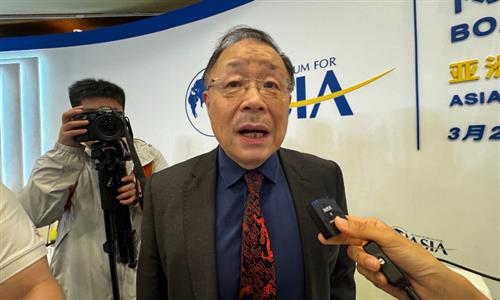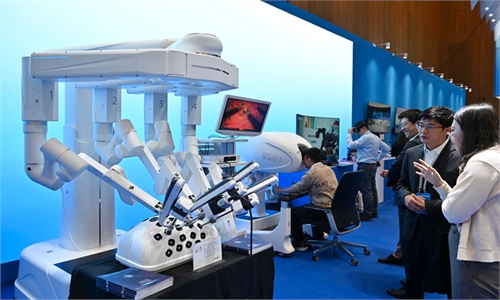AI remains key engine for boosting China's development in new quality productive forces: experts

AI Photo: VCG
China's technological development in the field of artificial intelligence (AI) has been rising rapidly amid its efforts to develop new quality productive forces, with some of the Chinese models being comparable to GPT-4 in some ways, top global experts and industry players said on Wednesday at the ongoing Boao Forum for Asia Annual Conference 2024.
China has major advantages of broader scenarios with more data and applications for developing AI and derived technologies, which provides a path for developing domestic large language models (LLMs) and AI, Yang Yanqing, executive director of the Digital Economy Institute at Shanghai Artificial Intelligence Laboratory, said at a subforum themed "AI-generated content (AIGC) Reshaping the World."
Yang said that China has been leading the world in industrial applications with huge potential in sectors such as education and healthcare.
"Some of the Chinese models are comparable to GPT-4 in some directions," Stuart Russell, author of Artificial Intelligence: A Modern Approach and a professor of Computer Science at University of California, Berkeley told the Global Times on the sidelines of the forum.
When it comes to the specific application of LLMs in China, Liu Cong, vice president of iFLYTEK, noted that the company has been integrating its operation into various industries such as healthcare, finance and others.
Cheng Qun, vice president of Yuanfudao Group, said at the forum that Yuanfudao has been developing LLMs dedicated to the education sector, which has made education more efficient at schools in remote areas. Cheng said that the deep combination and application of LLMs with various industries is a must for advancing technical development.
Liu noted that the adoption of "AI plus" may become a major engine for promoting the development of new quality productive forces.
China will step up research and development and the application of big data and AI, launch an AI Plus initiative, and build digital industry clusters with international competitiveness, according to this year's Government Work Report.
AI will contribute to developing new quality productive forces through elevating production efficiency, improving the industrial structure and increasing innovation capacity, Wang Peng, an associate research fellow at the Beijing Academy of Social Sciences, told the Global Times on Wednesday.
Since China is a major economy in Asia, its progress and innovation in emerging sectors will propel the development of these sectors in Asia and enhance Asia's position and influence in the global economy, while promoting regional technological cooperation and exchanges, analysts said.
Speaking on collaboration and competition between China and the US in the AI sector, Russell said that collaboration on safety and benefits to humanity is essential, and competition is healthy. The idea that it is a zero-sum game as one team is going to win and the other team is going to lose is a huge mistake.
Experts stressed that challenges remain for China to further advance its development in the AI sector, with the company striving to fill the gap.
For instance, Wang noted the lack of talent, regulation on data security and stepping up innovation capability as the major challenges for China to advance its development in cutting-edge sectors.



